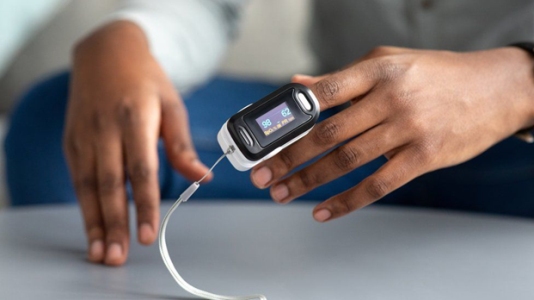Improving pulse oximeters for minority groups
Published: 23 May 2022
Read more

QuantIC researchers are working with German semiconductor manufacturer, Elmos, to improve pulse oximeters for all and provide universally greater healthcare.
Pulse oximeters are among the most common optical devices for monitoring blood oxygenation levels and are now deployed in electronic gadgets such as smartwatches and healthcare monitoring devices in hospitals and clinics. These devices play an essential role in modern day healthcare and were critical during the COVID-19 pandemic in the detection of blood oxygenation levels in hospitalised patients. Pulse oximeters have a global market size of $2.3 billion and are expected to grow by 10.1% from 2021 to 2026 (MarketsAndMarkets).
Currently, existing pulse oximeters need to be calibrated with prior information that is influenced by skin tone and finger anatomy. As a result, they may not provide accurate results in patients with darker skin tones or smaller anatomy.
Through this project scientists, from the University of Edinburgh, aim to develop a quantum-enhanced pulse oximeter which is independent of changes in light intensity requiring no prior information, therefore minimising the effect of variations in skin tone and finger anatomy. In turn, eliminating the bias which proved critical during the COVID-19 pandemic.
Traditional pulse oximeters measure the oxygen levels in the blood by illuminating two or more wavelengths of near-infrared light and calculating oxygen levels using the relative difference in the absorption of these wavelengths in the tissue. Typically, the light source consists of 2 LEDs at different near infrared wavelengths that illuminate the tissue in sequential order so that the photodetector can detect a single wavelength at a time. The intensity from the LED illumination is reduced as it passes through the finger. This reduction is due to both absorption and scattering of photons as they travel from the source and the detector. However, it is not possible to distinguish between the effect of absorption and scattering.
“QuantIC’s funding provides a unique opportunity to contribute to improving oxygenation measurements by increasing accuracy and reliability. With support from the latest generation of laser drivers by Elmos as a laser source for our time-of-flight based pulse oximeters.” said Dr Danial Chitnis, lead researcher from the University of Edinburgh.
This quantum detector’s ultra-fast capabilities will not be affected by skin tone or tissue thickness, therefore increasing the robustness and reliability of the oxygenation measurement.
Quantum imaging is pioneering the next generation of wearable healthcare devices. Our solutions are accessible to a wider market and impacting society, from emergency responders to fitness trackers.
First published: 23 May 2022

